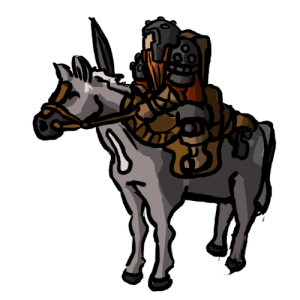 From the journal of Barnard of Shelton, master trader in the employ of the Illyria Trade Council, recording his journeys to the Broken Lands.
From the journal of Barnard of Shelton, master trader in the employ of the Illyria Trade Council, recording his journeys to the Broken Lands.
I was invited to join two scruffy Dwarves, as they played dice with a gang of goblins. It was not the reception that I had expected.
The Overoad Traders, from the reports I had heard, control the foremost commercial network in these lands, with a range of well established trade centres stretching from the peaceful lands of Virten out into the wild and dangerous lands to the east. When I asked to be permitted to discuss possible trade deals with some of their leaders, I did not expect to be invited to play dice with ruffians.
I had expected, as in my own homelands, to be invited to a well established guild house or palace, where negotiations would proceed in measured tones in luxurious surroundings. Instead I found myself gambling with goblins.
The two dour Dwarves who led the game had planted a staff in the ground, adorned with tattered parchments listing the wares that they had for sale, and topped with an astrolabe, as a wizard’s staff might have some mighty crystal. And wherever such a staff is planted, that becomes a headquarters, for a while, for these rough traders. It is a far cry from a grand guild hall.
The two greeted me without enthusiasm. They explained the rules of the game, which were surprisingly complex, and told me to drag across a box to sit on.
As the dice were passed around, they quaffed ale from huge wooden mugs and wiped their mouths on their sleeves, and they started to quiz me about what I wanted to trade and at what prices. I outlined a possible proposal to gauge their interest, and was told, curtly, “It won’t work. I’d have to sell the cargo on at Cloghord’s Haven, and my costs mean I’ll only make six point seven percent.”
“Point six,” the other Dwarf corrected him.
The first Dwarf fiddled with four bulky rings on the fat fingers of his left hand. “No, point seven.”
“We promised Scritgut a raise,” the second nodded towards one of the goblins. “Include that in.”
More ring fiddling. “Six point five eight. You’re right. Anyway, the journey’s too dangerous. We have to factor in likely losses, so your price is too high. Now, whose throw?”
And so the conversation, and the game, continued. The Dwarves, it transpired, were two of the leaders of the Traders. At least, they had their own trade caravans, which in the chaotic world of the Traders made them leaders of sorts. And they were very happy to discuss major transactions while half distracted, it seemed, with a petty game of chance.
“Not game of chance!” one of the goblins objected when I commented on this. “Probability! Math-e-menatics!”
“He’s right,” the Dwarf concurred. It’s all about calculations and probabilities, just like trade is.”
“But still, is this a suitable place to discuss a trade deal?” I asked.
“Of course. My mind’s on numbers. And any deal we do, my friends share the risk, so they should hear what you have to say.” He saw that I looked surprised at his use of the word. “Friends? What, when you trade, who do you travel with?”
“Well, employees, servants….”
“We rely on each other. Rank doesn’t matter. Out there, we live or die based on each other, and we have enough enemies already. It has been like this for generations. When the Sundering broke the mountains, the Dwarven race was swallowed up. Some say that only three thousand of us survived. It must have been more, but the point is, almost everyone died. Our ancestors were trapped above ground while their families were crushed to death under the fallen mountains….”
And so he started to explain. He explained that the scattered Dwarves had become wandering craftsmen and traders, at last finding trade to be the more profitable path. He also told me what happened to the goblins.
“After the Sundering the Orc armies weren’t used to getting their own food. So when the survivors had nobody to send them supplies, they ate the weakest amongst their ranks. That meant that they ate the goblins. The goblins who got away also had no idea how to fend for themselves. The mages had only wanted them as scouts and killers – they hadn’t taught them to farm or forage or cook. So, those that our ancestors met they took in, and fed. These goblins, my friends, are descended from those my ancestor rescued five centuries since.”
The Overoad Traders, he explained, needed others to help them. There just weren’t enough Dwarves to perform all the tasks required in all their trade missions. And the goblins were outstanding servants – or as he put it, partners. They were excellent scouts, cunning and swift, they could look after pack animals, they could learn any simple skill, and if needs be they could be merciless. And they ate only half what a Dwarf or Human would eat, “which means we carry and buy fewer provisions. So we’d rather work with them than with humans. Not that we don’t have human partners. Anyone can join up. But the goblins have always been our best friends.”
Travelling light was important to the Traders, I realised. They carried no ledgers, but held all of their accounts in their heads. “This month is set to be my best in 2 years, by three point four percent,” he mentioned, apparently without thinking about it. They had no offices, no clerks. Everything was calculated through their well practised mental arithmetic, which, if needed, could be verified by the use of the four heavy rings which each wore: these four, made of several bands of metal which could be adjusted individually, were like a more complex abacus. One of the two also wore a pendant which was, I realised, a kind of portable sun-dial.
These, then, were not the degenerate gamblers that I had feared that they were when I sat down with them. They were clever, pragmatic survivors, and their approach to trade, though alien to me, is perfectly suited to survival, and perhaps profit, in a hostile land.
